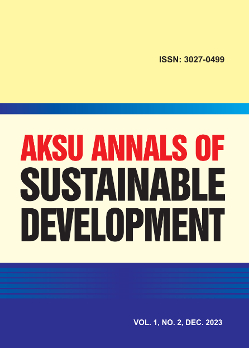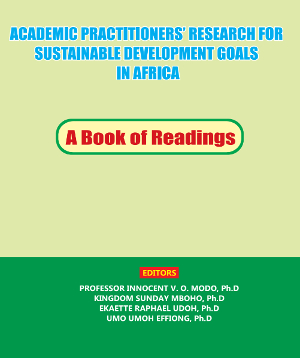JURISPRUDENCE, CRIMINAL JUSTICE SYSTEM AND PUBLIC ORDER IN AKWA IBOM STATE, NIGERIA
https://doi.org/10.60787/AASD-1-1-3
Keywords:
traditional African societies, public order, criminal justice system, JurisprudenceAbstract
This paper examined jurisprudence, criminal justice system and public order in the traditional African societies. It was a qualitative study that was guided by four objectives. Data were collected from secondary sources and were used in the review of literature and other discussions. Findings of the study indicated that jurisprudence system was anchored by a arrangement which relied on the convenience of maleness and manhood in the appointment of functionalists. In the context of traditional society, the principle of primogeniture provided much needed benefits associated with accountability, responsibility and maturity in handling the affairs of the vulnerable members. Unfortunately, this principle was compromised by the essence of maleness which brightened its efficacy. Virtually, all leadership positions including family headship and traditional leadership were occupied by senior men. Womanhood was a sufficient disqualifying factor regardless of individual qualities and merit. This reality gave indigenous African law the undeniable label of a patriarchal system. It is recommended among others that African jurisprudence be preserved and allowed to function side by side with the English common law because of its significance. Also, agents of modern laws should be well trained on the importance of African jurisprudence in the handling of cases involving traditional institutions and overseeing the maintenance of order at the grassroot.
Downloads
References
Abah, P. and Utomwem (2003), “The Bullion Van Robbery”, The News, 22 September, pp. 20 – 22.
Acemoglu, D. and Wolitzky, A. (2020). A theory of equality before the law. The Economic Journal, 131 (May): 1429–1465 DOI: 10.1093/ej/ueaa116 2020 Royal Economic Society, Oxford University Press.
Acemoglu, D. and Jackson, M. O. (2017). Social norms and the enforcement of laws.Journal of the European Economic Association, 15 (2): 245-95.
Acemoglu, D. and Robinson, J. A. (2000). Why did the west extend the franchise? Democracy, inequality, and growth in historical perspective, Quarterly Journal of Economics, 115 (4): 1167-99.
Adegbamigbe, A. (2001) “Robbers in Police Uniform” The News, 16 April, Vol. 16, No. 15, pp. 14 – 23.
Adejuwon, L. (2009) “Daming Report”, The Week. Vol. 29, April 6, pp. 20 – 21.
Ademgbamigbe, A. (2004) “Sores of the Earth: Confessions of a Robber Pastor”, The News, 8 March, pp. 20 – 25.
Agbaegbu, T. (2006) “Killing for Money”, Newswatch, October 2, Vol. 44, No. 14, pp. 18 – 34.
Akintunde, K. (2007) “Robbers Everywhere”, Newswatch, December 24, Vol. 46, No. 25, pp. 16 – 23.
Abah, P. and Utomwem (2003), “The Bullion Van Robbery”, The News, 22 September, pp. 20 –22.
Acemoglu, D. and Wolitzky, A. (2020). A theory of equality before the law. The Economic Journal, 131 (May): 1429–1465 DOI: 10.1093/ej/ueaa116 2020 Royal Economic Society, Oxford University Press.
Acemoglu, D. and Jackson, M. O. (2017). Social norms and the enforcement of laws.Journal of the European Economic Association, 15 (2): 245-95.
Acemoglu, D. and Robinson, J. A. (2000). Why did the west extend the franchise? Democracy, inequality, and growth in historical perspective, Quarterly Journal of Economics, 115 (4): 1167-99.
Adegbamigbe, A. (2001) “Robbers in Police Uniform” The News, 16 April, Vol. 16, No. 15, pp. 14 – 23.
Adejuwon, L. (2009) “Daming Report”, The Week. Vol. 29, April 6, pp. 20 – 21.
Ademgbamigbe, A. (2004) “Sores of the Earth: Confessions of a Robber Pastor”, The News, 8 March, pp. 20 – 25.
Agbaegbu, T. (2006) “Killing for Money”, Newswatch, October 2, Vol. 44, No. 14, pp. 18 – 34.
Akintunde, K. (2007) “Robbers Everywhere”, Newswatch, December 24, Vol. 46, No. 25, pp. 16 – 23.
Amall Arms Survey (2007). Mode of production and law and justice in neo-colonial state: the case of Nigeria. Liwuram Journal of Humanities, 7.
Atunpulazi, J. (2007) “Missing in Custody”, The Week, 26 July, pp. 30 – 31.
Ben, V. E. (2013). Ethnic pluralism and national identity in Nigeria. In Nsikan-Abasi S. Nkana,
Felicia S. Ekpu & Robert O. Dode (2013). Citizenship and Peace Studies. Uyo: chf Prints, 30-41.
Dambazau, A. B. (2007) Criminology and Criminal Justice. Ibadan: Spectrum Books Ltd.
Effiong, U. and Ekpenyong, O. (2017). Community-Based Rehabilitation Services and
Livelihood Enhancement for Persons with Disabilities in Nigeria: A Case Study of Akwa
Ibom State. Journal of Sociology, Psychology and Anthropology in Practice, 8(1), 62 – 67.
Effiong, U. U.(2019). Cultural Dynamics of Burial Rites in Annang Traditional Society.
AWOROM: Annañ Studies Journal, 1(1), 92-102.
Ekpo N., Nkanta, N. C. and Effiong U. U. (2023). Traditional Songs And Cultural Development
Of Anaañ People: A Case Study of Anaañ Women’s Play Songs. In:
Innocent V. O. Modo, Kingdom S. Mboho, Ekaette R. Udoh and Umo U. Effiong
(Eds) Academic Practitioners Research for Sustainable Development Goals in Africa.
ICIDR Publishing House.
Eme, O. I. (2004) “Insecurity Question in Nigeria: A Thematic Exposition”, The Academy, Vol.
, No. 4, (July) pp. 8 – 9.
Eme, O. I. (2009) “Ethno-Religious Identities in Nigeria: Implications for Good Governance in
Nigeria”. A Paper submitted to the Editor-in-Chief of a Book Project on Islam and
Governance in Nigeria.
Fajnzylber, P. et al. (2001) “Crime and Victimization: An Economic Perspective”, Economia,
(1), pp. 219 – 278.
Fasua, O. et al. (2006) “Police at the Mercy of Armed Bandits”, Tell, 20 October, pp. 13 – 18.
Field, S. (1990) Trends in Crime and their Interpretations: A study of Recorded Crime in Postwar England and Wales, London: Home Office Research.
Haralambos, M., Holborn, M. and Heald, R. (2004). Sociology: themes and perspectives (6 eds.).
London: HarperCollins Publishers Limited.
Human Rights Watch (2005) “Rest in Pieces”. Police Torture and Deaths in Custody in Nigeria.
Ibeanu, O. (2007) Beyond Declaration: Law Enforcement Officials and ECOWAS Protocol on
Force Movement of Persons and Goods in West Africa. Lagos: Centre for Law Enforcement
Education (CLEEN) Foundation.
Ibrahim, J. and Igbuzor, O. (2002) “Memorandum submitted to the Presidential Committee on
National Security in Nigeria”.
Kolo, B. G. (2002) “Public Perception of the Police as an Element in the Criminal Justice
System”, The Nigerian Social Scientist, Vol. 5, No. 2, pp. 13 – 15.
Mba-Afolabi, J. (1999) “Criminals on the Prowl” Newswatch, August 16, Vol. 30, No. 6, pp. 8 –
Moore, M. H., Trojan Wicz, R. C. and Kelling, G. L. (1998), Crime and Policy: Perspectives on
Policing, Washington, National Institute of Justice.
Nweje, M. O. (1975) “In Search of Justice”, in Elias, T. O. et al. (eds.) African Indigenous Law
Proceedings of Workshop. Enugu: Government Printer.
Odekunle, F. (1978) “The Nigerian Police Force: A Preliminary Assessment of the Functional
Performance”, International Journal of Sociology of Law, No. 7.
Oladipo, D. (1999) “Why They Fail”, Newswatch, August 16, Vol. 30, No. 6, pp. 10 – 15.
Oladipupo, S. (2005) “Police as Public Enemy”, Nigerian Newsworld, July 18, Vol. 11, No. 25,
pp. 12 – 16.
Olonsisakin, F. (2008) “In the Line of Fire”, BBC Focus on Africa (April – June) pp. 19 – 23.
Omenuwa, O. (2001) “At the Mercy of Armed Robbers”, The News, 2 July, pp. 16 – 24.
Onyemaizu, C. (2006) “In the Maze of Violence”, The Source, September 4, Vol. 19, No. 22, pp.
– 21.
Oputa, C. A. (1975) “Crime and the Nigerian Society”, in Elias, T. O. et al. (eds.) African
Indigenous Laws Proceeding of Workshop. Enugu: Government Printer.
Redden, K. R. and Veron, E. L. (1980) Modern Legal Glossary. Virginia: The Michi Coy.
Sa’ad, A. M. (1995) “Human Rights, The Police and Criminal Justice Process in Nigeria”,
Journal of Social and Management Studies, Vol. 2.
Sa’ad, A. M. (1998) The Police in Modern Nigeria, 1861 – 1965. Ibadan: Ibadan University
Press.
Downloads
Published
Issue
Section
License
Copyright (c) 2024 AKSU Annals of Sustainable Development

This work is licensed under a Creative Commons Attribution-NonCommercial-NoDerivatives 4.0 International License.
Manuscript content on this site is licensed under Creative Commons Licenses. Authors wishing to include figures, tables, or text passages that have already been published elsewhere are required to obtain permission from the copyright owner(s) for both the print and online format and to include evidence that such permission has been granted when submitting their papers. Any material received without such evidence will be assumed to originate from the authors.






 ICIDR Publishing House
ICIDR Publishing House